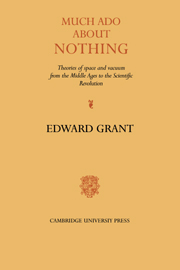 Much Ado about Nothing
Much Ado about Nothing Book contents
- Frontmatter
- Contents
- Preface
- Part I Intracosmic space
- Part II Infinite void space beyond the world
- 5 The historical roots of the medieval concept of an infinite, extracosmic void space
- 6 Late medieval conceptions of extracosmic (“imaginary”) void space
- 7 Extracosmic, infinite void space in sixteenth- and seventeenth-century scholastic thought
- 8 Infinite space in nonscholastic thought during the sixteenth and seventeenth centuries
- Part III Summary and reflections
- Notes
- Bibliography
- Index
8 - Infinite space in nonscholastic thought during the sixteenth and seventeenth centuries
Published online by Cambridge University Press: 07 October 2011
- Frontmatter
- Contents
- Preface
- Part I Intracosmic space
- Part II Infinite void space beyond the world
- 5 The historical roots of the medieval concept of an infinite, extracosmic void space
- 6 Late medieval conceptions of extracosmic (“imaginary”) void space
- 7 Extracosmic, infinite void space in sixteenth- and seventeenth-century scholastic thought
- 8 Infinite space in nonscholastic thought during the sixteenth and seventeenth centuries
- Part III Summary and reflections
- Notes
- Bibliography
- Index
Summary
THE IMPACT OF THE NEW GREEK TREATISES
As nonscholastic interpretations and approaches to nature gained adherents during the sixteenth and seventeenth centuries, many of whom would be among the leading scientific and philosophical thinkers of the period, a common attitude toward scholastic authors and their works developed. When not characterized by downright hostility and contempt, this attitude is best described as indifference. With regard to discussions of space and vacuum generally and infinite space in particular, indifference was usually manifested by silence. Except for occasional mention of an opinion or attitude of the “schools” or “schoolmen,” and even one specific and respectful citation of scholastic sources, nonscholastic authors chose to document and support their varied arguments about space, whether associated with God or not, with ancient Greek authors (Plato, Proclus, Epicurus, the Stoics, Hero, Simplicius, Plutarch, Philoponus, Hermes Trismegistus, etc.), the Church Fathers, Cabbalists, and nonscholastic predecessors and contemporaries. Silence about, or contempt for, the large and detailed scholastic literature on infinite space does not and cannot legitimize the inference that scholastic ideas about space and God played no role in shaping nonscholastic interpretations and opinions. It only makes the determination of such influences difficult to demonstrate and document. As the previous chapters have shown, the problem of infinite space and its relationship to the deity had engaged the attention of scholastic authors since the fourteenth century.
Information
- Type
- Chapter
- Information
- Much Ado about NothingTheories of Space and Vacuum from the Middle Ages to the Scientific Revolution, pp. 182 - 256Publisher: Cambridge University PressPrint publication year: 1981
Accessibility standard: Unknown
Why this information is here
This section outlines the accessibility features of this content - including support for screen readers, full keyboard navigation and high-contrast display options. This may not be relevant for you.Accessibility Information
- 2
- Cited by